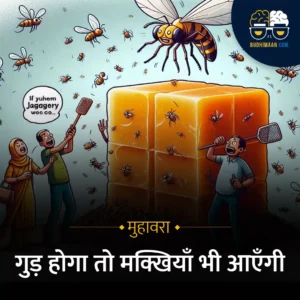परिचय: ‘जंगल में मोर नाचा, किसने देखा’ एक प्रमुख हिंदी मुहावरा है, जिसका उपयोग हम उस समय करते हैं जब कोई व्यक्ति अपनी प्रतिभा या क्षमता का प्रदर्शन किसी ऐसी जगह पर करता है जहाँ कोई उसे देखने वाला नहीं होता।
अर्थ: इस मुहावरे का सीधा अर्थ है कि मोर जंगल में अपने रंगीन पंख फैलाकर नाच रहा है, परंतु वहां कोई भी उसे देखने के लिए मौजूद नहीं है। अतः, उसका प्रदर्शन बेमानी हो जाता है।
उदाहरण:
-> पूजा ने अपने नए ड्रेस को जब वह सुनसान गली में पहना, तो अभय ने कहा, “जंगल में मोर नाचा, किसने देखा!”
-> अभय अक्सर अपनी गिटार बंद कमरे में बजाता है तो उसके घरवालों ने कहा तू बाहर क्यों नहीं बजाता, यहाँ तुझे कौन देख रहा है। यहाँ पे तो “जंगल में मोर नाचा, किसने देखा” वाली कहावत चरितार्थ होती है।
विशेष टिप्पणी: जब कोई व्यक्ति अपनी प्रतिभा, कला या क्षमता का प्रदर्शन करता है, उसकी इच्छा होती है कि लोग उसे देखें, प्रशंसा करें। परंतु, अगर उस प्रदर्शन का कोई दर्शक नहीं होता, तो वह प्रदर्शन अधूरा सा लगता है।
निष्कर्ष: यह मुहावरा हमें यह सिखाता है कि हमें अपनी प्रतिभा और क्षमता का प्रदर्शन उस समय और उस जगह पर करना चाहिए जब हमें पता हो कि लोग हमें देख रहे हैं और हमारी प्रतिभा को समझ और प्रशंसा कर सकते हैं।

जंगल में मोर नाचा, किसने देखा मुहावरा पर कहानी:
अभय एक स्मार्ट और प्रतिभाशाली लड़का था। उसमें गाने, नृत्य, और चित्रकला की अद्भुत प्रतिभा थी। लेकिन वह अजीब था। जब भी वह अपनी प्रतिभा का प्रदर्शन करता, वह अपने कमरे के दरवाजे को बंद कर लेता।
एक दिन उसके मित्र अनुज ने पूछा, “अभय, तुम जब भी कुछ अच्छा करते हो, तो तुम अपने कमरे में ही क्यों बंद हो जाते हो? तुम्हें अपनी प्रतिभा को दुनिया के सामने प्रस्तुत करना चाहिए।”
अभय मुस्कराया और बोला, “अनुज, मैं अपनी प्रतिभा से प्रेम करता हूँ, लेकिन मैं उसे सिर्फ अपने आप के लिए प्रदर्शित करता हूँ। मुझे लगता है कि जब मैं अकेला होता हूँ, मैं अपनी सबसे अच्छी प्रतिभा का प्रदर्शन करता हूँ।”
अनुज थोड़ा चिंतित हो गया और बोला, “लेकिन अभय, तुम्हारी प्रतिभा को लोगों को भी देखना चाहिए। तुम ‘जंगल में मोर नाचा, किसने देखा?’ की तरह हो।”
अभय की आंखों में एक चमक आई और वह बोला, “शायद तुम सही हो, अनुज। मैं अपनी प्रतिभा को लोगों के सामने प्रस्तुत करना चाहिए।”
और फिर अभय ने अपनी प्रतिभा का प्रदर्शन सभी के सामने किया और सभी लोग उसकी प्रतिभा को देखकर हैरान रह गए। वह समझ गया कि अपनी प्रतिभा को अधिक लोगों तक पहुँचाना चाहिए, न कि उसे छिपाकर रखना चाहिए।
निष्कर्ष: अगर हमारी प्रतिभा या क्षमता है, तो हमें उसे सीमित नहीं रखना चाहिए। उसे दुनिया के सामने प्रस्तुत करना चाहिए ताकि लोग हमें और हमारी प्रतिभा को समझ सकें।
शायरी:
जंगल में मोर नाचा, किसने जाना।
जीवन में खुदा जैसी चीज भी है अनदेखी।
चुपचाप अपने आँगन में, खुद से मोहब्बत की बातें।
हर खामोशी में एक दास्तान है छुपी।

आशा है कि आपको इस मुहावरे की समझ आ गई होगी और आप इसका सही प्रयोग कर पाएंगे।
Hindi to English Translation of जंगल में मोर नाचा, किसने देखा – Jungle me mor nacha kisne dekha Idiom:
Introduction: “जंगल में मोर नाचा, किसने देखा” (The peacock danced in the forest, but who saw it?) is a prominent Hindi idiom. We use it when someone showcases their talent or capability in a place where there’s no audience to appreciate it.
Meaning: The literal interpretation of this idiom is that a peacock is dancing, displaying its vibrant feathers in the forest, but there’s no one present to witness its beauty. Thus, its performance goes unnoticed and is in vain.
Examples:
-> When Pooja wore her new dress in a deserted alley, Abhay commented, “The peacock danced in the forest, but who saw it?”
-> Abhay often plays his guitar in a closed room. His family suggested he play outside instead, questioning who’s watching him inside. They remarked that it’s like “The peacock danced in the forest, but who saw it?”
Special Note: When someone displays their talent, art, or capability, they usually desire acknowledgment and appreciation. However, if there’s no audience to witness this showcase, the performance feels incomplete.
Conclusion: This idiom teaches us that we should present our talent and capabilities at the right time and place, ensuring that there are people who can understand and appreciate our skills.
Story of Jungle me mor nacha kisne dekha Idiom in English:
Abhay was a smart and talented boy. He possessed extraordinary abilities in singing, dancing, and art. However, he had a peculiar habit. Whenever he showcased his talent, he would close the door to his room.
One day, his friend Anuj asked, “Abhay, why do you always lock yourself in your room whenever you do something exceptional? You should present your talent to the world.”
Abhay smiled and responded, “Anuj, I love my talent, but I perform only for myself. I feel that when I am alone, I deliver my best.”
Anuj became a bit concerned and said, “But Abhay, people should also witness your talent. You are like ‘The peacock danced in the forest, but who saw it?’.”
A sparkle appeared in Abhay’s eyes, and he remarked, “Perhaps you’re right, Anuj. I should showcase my talent to the world.”
Then, Abhay performed in front of everyone, leaving them all in awe of his abilities. He realized that he should share his talent with more people rather than keep it hidden.
Conclusion: If we have a talent or capability, we shouldn’t limit it. We should present it to the world so people can understand and appreciate us and our abilities.
I hope this gives you a clear understanding of the proverb and how to use it correctly
FAQs:
क्या इस मुहावरे का अन्य रूप है?
हां, इसे “जंगल में मोर पंख नहीं होते” के रूप में भी कहा जा सकता है।
इस मुहावरे का उपयोग किस संदर्भ में किया जा सकता है?
इस मुहावरे का उपयोग उन स्थितियों में किया जा सकता है जब कोई किसी असम्भावित घटना की बात कर रहा हो जो सम्भावना से बाहर हो।
क्या इस मुहावरे का कोई वास्तविक उदाहरण है?
नहीं, यह मुहावरा केवल भाषा का एक हिस्सा है और इसका कोई वास्तविक उदाहरण नहीं है।
क्या यह मुहावरा सकारात्मक या नकारात्मक अर्थ में प्रयुक्त हो सकता है?
इस मुहावरे का प्रयोग आमतौर पर नकारात्मक अर्थ में किया जाता है, क्योंकि इससे किसी अस्तित्वहीन घटना की बात करना होता है।
इस मुहावरे का उत्पत्ति से संबंधित कोई किस्सा है?
जी हां, इस मुहावरे का उत्पत्ति से संबंधित एक पुराना किस्सा है जिसमें किसी गाँव के लोग झूला देखकर यह मुहावरा उत्पन्न हुआ था।
हिंदी मुहावरों की पूरी लिस्ट एक साथ देखने के लिए यहाँ क्लिक करें
यह मुहावरा जानवर पर मुहावरे पेज पर भी उपलब्ध है।
यह मुहावरा ज से शुरू होने वाले मुहावरे पेज पर भी उपलब्ध है।








